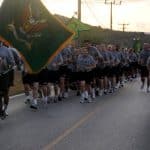When I met my wife, we were, in many ways, a world apart. I grew up in a chaotic and destructive split-home home. My wife still had two loving and married parents. While by no means perfect and having had her own trials and tribulations, our childhoods were vastly different. By the time I met her, I had survived all of that, joined the military, passed RIP, deployed four times with Regiment, left the military, completed a few years of college, and lost more than a few friends along the way. When I met my wife, she was an aspiring cadet at the college we attended, high school still visible in the rear-view mirror.
Despite our vastly different experiences, I saw something in her. I saw this drive all too familiar. What I saw was a woman willing to complete a task, no matter how mundane, to the standard, if not beyond. We met through a fellow cadet, who I was friends with at the time. He had asked me to help run some of their workouts. I watched as other cadets found every excuse to quit while my wife would rather skip the shower and risk being late to class rather than quit. I am not going to sit here and say our life has always been a bed of roses. We have had more than our fair share of issues, especially early on.
Within a few months of us talking, not even having made it “official,” a veteran friend of mine unexpectedly took his own life. It was a loss that has impacted me in profound ways even today, years later. I felt sort of stuck. I was not sure if I wanted to invite this woman into that kind of world, but I also knew I did not want to go to the funeral alone. My dilemma was apparently obvious because she told me one night that if I wanted her to go, I would have to ask her, and if I did not want her to go, just say so. That was the first time I invited my wife into the world I had not really shared with anyone else.
In our early years, anniversaries were always hard for us. I wanted to be left alone, knowing I would be irritable and caught in my own thoughts. I just needed these days to myself. I needed to lift harder, drink a few, and just be left in silence. For my wife, this was foreign, she wanted to fix that which could not be fixed. It was a noble cause, but an impossible one that caused conflict. This type of conflict also arose when I took late-night phone calls or kept company with struggling veterans. This conflict was not without merit.
The results of these things often left me irritable, unable to sleep, and emotionally distant. Despite it all, I kept trying to include her in my world. I wanted her to understand, in full. I had watched, and still do, how many relationships fell to pieces under the weight of the divide. When I took her to meet my fellow ranger buddies, I told her that was a bigger deal than her meeting my family. To this day, she is the only person I ever dated that has met them.
With every passing year, we gained ground inch by inch until she deployed. Her job was to support special operations units, one of which was rangers. When she deployed to Afghanistan, the battalion she was supporting got into a firefight and lost someone. My wife called, not being able to talk about any of it (something all too familiar to me) and simply said, “I get it now.” I immediately understood what she meant, as the news had already broken the story. She told me she had seen “me” every day in the gym, bouncing around, fucking with each other, and laughing too loud. The next day, she saw “me” … the me that had my headphones in all day. The me that did not say a word to anyone. The me lost somewhere she did not understand.
My wife now simply asks me if I need anything. My answer is always “no.” She often gives me a kiss, lets me know she is always there if I need anything, and then she often disappears somewhere, leaving me to whatever I need (often a few drinks, maybe video games, and my thoughts). I always hate to say it, but that loss was the best thing that ever happened to our marriage. It helped open a door of understanding that has translated into so much more. I know that not everyone can have this same unique experience, but what you can do is share those parts of you with your spouse. You can establish ground rules, parameters, and whatever you need.
There are times I tell my wife: “I want to tell you a story. You cannot fix what I am about to tell you, I just want you to understand.” Giving her unfathered access to my fellow veteran friends has given her a better understanding as to what I have experienced and how it affects people. My wife has also learned to share with me her limits.
I do not hold all of the answers, but I do know that these divides we create separate us from those we love the most. We create these walls to protect them from the pain and suffering we endure from these experiences. I see it a lot as a cop too, families divided by toxic walls of good intentions. One must not look far to see how these divides have destroyed relationships; most readers would likely have to look only in the mirror.
I am not saying you have to provide them with each and every gruesome detail, but you do need to help them understand. I can come home, shake off my boots, and tell my wife, we had a kid get killed by a car today, it really kind of sucked. That is enough for us, for her to understand. Those well-intentioned walls only trap us in the toxic sludge alone, leaving our actions without understanding, and our loved ones alone on the other side.

_________________
This first appeared in The Havok Journal on February 9, 2023.
Jake Smith is a law enforcement officer and former Army Ranger with four deployments to Afghanistan.
As the Voice of the Veteran Community, The Havok Journal seeks to publish a variety of perspectives on a number of sensitive subjects. Unless specifically noted otherwise, nothing we publish is an official point of view of The Havok Journal or any part of the U.S. government.
Buy Me A Coffee
The Havok Journal seeks to serve as a voice of the Veteran and First Responder communities through a focus on current affairs and articles of interest to the public in general, and the veteran community in particular. We strive to offer timely, current, and informative content, with the occasional piece focused on entertainment. We are continually expanding and striving to improve the readers’ experience.
© 2024 The Havok Journal
The Havok Journal welcomes re-posting of our original content as long as it is done in compliance with our Terms of Use.



